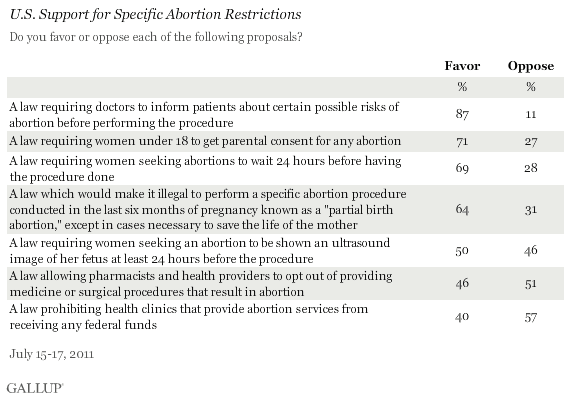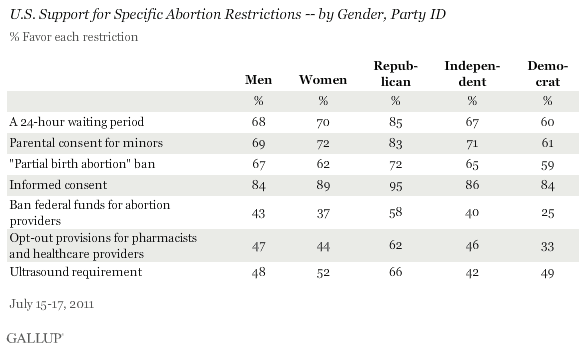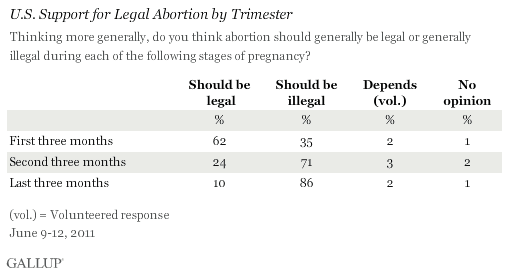PRINCETON, NJ -- Large majorities of Americans favor the broad intent of several types of abortion restriction laws that are now common in many states, but have mixed or negative reactions to others.

Of seven abortion restrictions tested in a July 15-17 Gallup poll, informing women of certain risks of an abortion in advance of performing it is the most widely favored, at 87%. Seven in 10 Americans favor requiring parental consent for minors and establishing a 24-hour waiting period for women seeking abortions. Nearly two-thirds favor making the specific procedure known as "partial birth abortion" illegal.
At the other extreme, 57% of Americans oppose laws prohibiting health clinics that provide abortion services from receiving any federal funds -- a policy akin to the recent efforts in Congress and some states to defund Planned Parenthood.
Americans are more mixed in their reactions to laws requiring women to see an ultrasound image of her fetus prior before having an abortion and to so-called "conscience laws" that allow pharmacists and other health providers to opt out of providing abortion services.
Partisan Gaps Dwarf Gender Differences
Gallup typically finds few differences between men's and women's attitudes about the legality of abortion in general. Consistent with that, the new poll shows relatively minor gender differences in views about the seven specific restrictions tested.
Partisan differences are much greater, although majorities of Democrats as well as most Republicans favor informed consent, parental consent, 24-hour waiting periods, and a ban on "partial birth abortion."
By contrast, Republicans and Democrats are on opposite sides when it comes to opt-out provisions and withholding federal funds from abortion providers.

Residents of the states where these laws have been passed may have views that differ from those of the public at large. While Gallup does not have state-level data on these questions, regional breakdowns show that residents of the South and Midwest are generally more supportive of the policies than those in the East and West. This is particularly true for attitudes on mandatory ultrasound counseling, parental consent laws, 24-hour waiting periods, and bans on funding of abortion clinics.
Most Americans Oppose Abortion in Advanced Trimesters
The abortion issue has had a relatively low profile in national politics in recent years, particularly by comparison with the activity seen at the state level. According to information compiled by the Guttmacher Institute, 19 states enacted 80 laws putting new restrictions on abortion in the first half of 2011, up from 23 such laws enacted in 2010 and shattering the previous record of 34 set in 2005.
The net result of this year's legislative activity is that, according to the Guttmacher Institute, 46 states now allow medical professionals and 43 allow at least some institutions to opt out of participating in abortions, 36 require parental involvement for minors (either notification or consent), 24 have waiting-period requirements, 19 mandate some sort of counseling, and 16 ban "partial birth" abortions.
Additionally, the Guttmacher report indicates that 39 states have limits on how late in pregnancy abortions can be performed, with exceptions for abortions necessary to protect the woman's life or health. Most of these laws prohibit abortion either after "viability," after 24 weeks, or in the third trimester.
According to recent Gallup polling, these gestation-based limits are consistent with Americans' hesitancy about late-term abortion. When asked if abortion should be legal in each of the three trimesters, 71% say it should be illegal in the second trimester and 86% in the third. This is according to a June 9-12 Gallup poll. However, 6 in 10 think abortion should be generally legal in the first trimester, consistent with prior Gallup polling showing that Americans reject overturning Roe v. Wade or banning abortion outright.

Bottom Line
Since the 1992 Planned Parenthood v. Casey Supreme Court case, which lowered the constitutional hurdle for state-level restrictions on abortion, "pro-life" lawmakers and activists have focused more of their efforts on chipping away at the legality of abortion in the states than on trying to win a sweeping ban in Washington.
After nearly two decades, these efforts have resulted in a patchwork of restrictions across the states, many of which enjoy broad public support. Most Americans favor laws that require abortion providers to inform women of certain risks and consequences of abortion and give parents more control over their daughters' reproductive decisions. They are also broadly receptive to laws that protect the fetus late in pregnancy, including "partial birth abortions." While Americans might not agree with specific aspects of all of these laws as enacted, they do favor the broad outlines as described in Gallup polling.
Other abortion restrictions have less public support. Nearly as many Americans oppose as favor requiring abortion providers to conduct ultrasounds and display ultrasounds for pregnant women seeking an abortion. The issue is making news in Texas as a "pro-choice" group is challenging that state's newly enacted ultrasound requirement in federal court. And despite laws in most states permitting medical providers to opt out of participating in abortions, the slight majority of Americans oppose this. However, public opinion stands most clearly against bans on federal funds for health clinics that provide abortions, something that could help Planned Parenthood and similar clinics thwart Republican efforts to do this at both the state and national levels.
Survey Methods
Results for this Gallup poll are based on telephone interviews conducted July 15-17, 2011, with a random sample of 1,020 adults, aged 18 and older, living in all 50 U.S. states and the District of Columbia.
For results based on the total sample of national adults, one can say with 95% confidence that the maximum margin of sampling error is ±4 percentage points.
Interviews are conducted with respondents on landline telephones and cellular phones, with interviews conducted in Spanish for respondents who are primarily Spanish-speaking. Each sample includes a minimum quota of 400 cell phone respondents and 600 landline respondents per 1,000 national adults, with additional minimum quotas among landline respondents for gender within region. Landline telephone numbers are chosen at random among listed telephone numbers. Cell phone numbers are selected using random-digit-dial methods. Landline respondents are chosen at random within each household on the basis of which member had the most recent birthday.
Samples are weighted by gender, age, race, Hispanic ethnicity, education, region, adults in the household, and phone status (cell phone only/landline only/both, cell phone mostly, and having an unlisted landline number). Demographic weighting targets are based on the March 2010 Current Population Survey figures for the aged 18 and older non-institutionalized population living in U.S. telephone households. All reported margins of sampling error include the computed design effects for weighting and sample design.
In addition to sampling error, question wording and practical difficulties in conducting surveys can introduce error or bias into the findings of public opinion polls.
For more details on Gallup's polling methodology, visit www.gallup.com.
